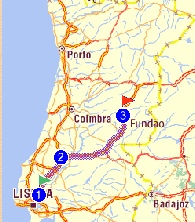|
KEY |
|
Topic |
|
CONTINENT |
|
Town |
|
|
|
|
|
|
|
EUROPE |
|
|
|
AFRICA |
|
|
|
|
|
ASIA |
Fundão -
Rebellion Against the Inquistion
According to Wikipedia The history of Fundão is intimately related to that of its originally Jewish, then New-Christian or Marrano population.
Although the place already was mentioned in documents from 1307 referring to 32 houses, the bulk of the population only settled after the 1492 Expulsion of the Jews from Spain by Ferdinand and Isabella. Close to the border, and already home to significant Jewish minorities the Cova da Beira region received many refugees. These came to settle in the place of Fundão, which their numbers swelled to that of a city. The influx of Jewish artisans and merchants quickly transformed it into an important commercial and industrial centre. With the establishment of the Portuguese Inquisition shortly thereafter, many Jews and new-Christians were arrested, tortured, executed or had their possessions expropriated. The commercial dynamism of the city was affected.
Maria Antonieta Garcia, who is a retired professor of Sociology at the the University of Beira Interior where she founded the Centre for Jewish Studies, records in ‘Inquisição e Independência, Um Motim No Fundao-1580’ (Inquisition and Independence, A Riot in Fundão-1580) the only known public act of resistance against the Inquisition in Portugal which occurred in Fundão on November 22, 1580.
Damião Mendes, a bailiff of the unHoly Office of the Inquisition reported that he was received at the door of a church by Estêvão Sampaio, the senior alderman in the town, and armed men who meant to kill him. He said they confronted him with the intention of impeding the work of the unHoly Office of the Inquisition. Bailiff Mendes complained of being pushed and knocked down, that the armed men broke his rod and took away his sword, that he was left without his hat and cape, and that he fell to the ground. They cut loose his horses and roughed up one of his men. He alleged that Sampaio spoke harshly to him and was rude, that he told him that he would take his rod and, lhe meteria pelo cu acima, and other such vulgar words.
As was customary in that period, the bailiff would have arrived in Fundão secretly, then made an announcement to the population to attend church on Sunday in honour of some saint. When the church was full, the doors would be locked by guards and the Old Christians would be called upon to identify the New Christians who would be handcuffed and led away to the subterranean jail cells of the unHoly Office, except this time, the secret was discovered and the bailiff was in for a surprise.
In July, Fundão, the town where the riot occurred, Estêvão de Sampaio, captain, was the eldest alderman. New Christians struggled against the Inquisition, and everyone, New Christians, and Old Christians, opposed the claim of jurisdiction by neighbouring Covilha and Guarda.
The place was proclaimed a city in 1580, by its notables after declaring support for the attempt by Dom António, Prior do Crato, to preserve Portuguese independence against the ambitions of the King of Spain Felipe II (Felipe I of Portugal). The Municipal Council and autonomy were granted in 1747.
Under the Enlightenment of the late 18th century the Prime-Minister of Portugal, the Marquis of Pombal abolished the legal restraints on the new-Christians and equilibrated them to the old-christians. He tried to recreate the industrial preeminence of Fundão by founding the Royal Factories (today the City Hall). These efforts allowed a measure of revival to the wool industries of the city, and cloth was again exported to northern Europe. The city decayed again after its sack during the (defeated) Napoleonic French invasions of Portugal, and the following Civil War between supporters of the Liberal Constitutionalist D. Pedro and his brother Conservative Absolutist D. Miguel for the throne.
The town is an important local centre of industry and services.
Around it lies some of the most fertile land in the region, in a large valley (Cova da Beira), between the Gardunha and Estrela ranges, where the Zêzere River starts its way towards the Tagus. The most significant productions are cherries, peaches, olive oil, wine, wood pulp and vegetables.
Some of the most important wolframite (most important mineral source of the metal tungsten) mines in the world are explored within its municipal limits. Other important mines extract lead and tin. High quality mineral water is bottled from several sources.
The Cavleiro tree is a common trade item from this region. It is used in everyday products such as wooden dolls, shoes and bedposts.
